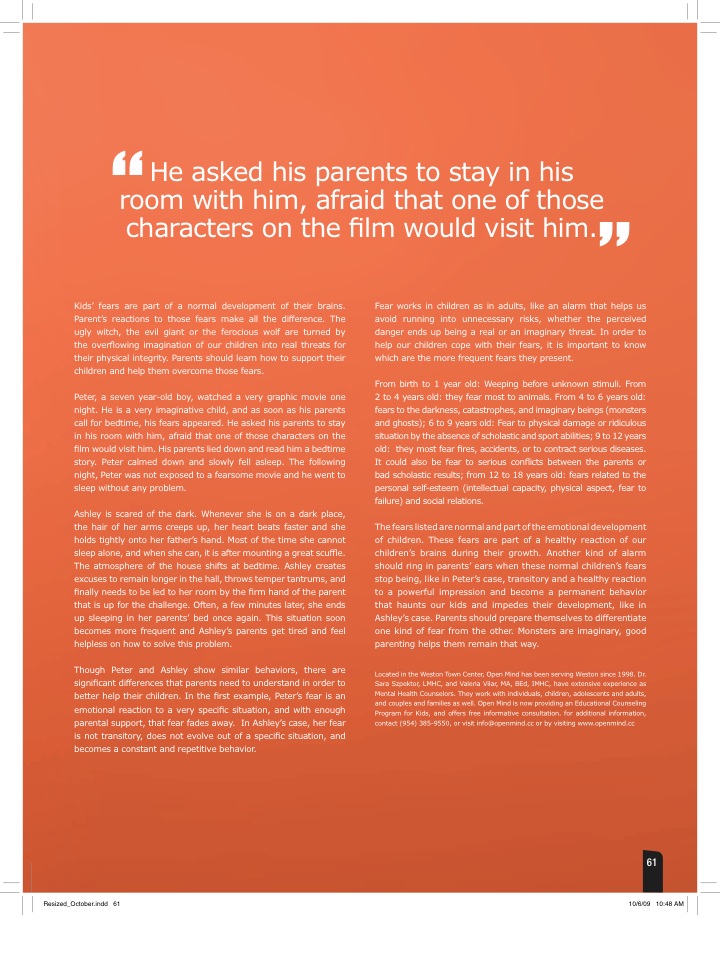Conquer your Kid's Fears



By Valeria Vilar, MA, LMHC, BEd
Kids’ fears are part of a normal development of their brains. Parent’s reactions to those fears make all the difference. The ugly witch, the evil giant or the ferocious wolf are turned by the overflowing imagination of our children into real threats for their physical integrity. Parents should learn how to support their children and help them overcome those fears.
Peter, a seven years boy, watched a very graphic movie one night. He is a very imaginative child, and as soon as his parents call for bed time, his fears appeared. He asked their parents to stay in his room with him, afraid that one of those characters on the film would visit him. His parents lied down and read him a bedtime story. Peter calmed down and slowly fell asleep.The following night Peter was not exposed to a fearsome movie and he went to sleep without problems.
Ashley is scared of the dark. Whenever she is on a dark place, the hair of her arms creeps up, her heart bits faster and she holds tightly onto her father’s hand. Most of the times she cannot sleep alone, and when she can, it is after mounting a great scuffle.
The atmosphere of the house shifts at bed-time. Ashley creates excuses to remain longer in the hall, throws temper tantrums, and finally needs to be led to her room by the firm hand of the parent that is up for the challenge. Often, a few minutes later, she ends up sleeping in her parents’ bed once again.
This situation soon becomes more frequent and Ashley’s parents get tired and feel helpless on how to solve this problem.
Though Peter and Ashley show similar behaviors, there are significant differences that parents need to understand in order to better help their children. In the first example, Peter’s fear is an emotional reaction to a very specific situation, and with enough parental support that fear fades away. On Ashley’s, her fear is not transitory, does not evolve out of a specific situation and becomes a constant and repetitive behavior.
Fear works, in children as in adults, like an alarm that helps us avoid running into unnecessary risks, whether the perceived danger ends up being a real or an imaginary threat.
In order to help our children cope with their fears it is important to know which are the more frequent fears they present. From birth to 1 year old: Weeping before unknown stimuli.
- From 2 to 4 years old: they fear most to animals.
- From 4 to 6 years old: fears to the darkness, catastrophes, and imaginary beings (monsters and ghosts);
- 6 to 9 years old: Fear to physical damage or ridiculous situation by the absence of scholastic and sport abilities;
- 9 to 12 years old: they most fear fires, accidents, or to contract serious diseases. It could appear fear to serious conflicts between the parents or bad scholastic results;
- from 12 to 18 years old: fears related to the personal self-esteem (intellectual capacity, physical aspect, fear to failure) and social relations. The fears listed are normal and part of the emotional development of children.
These fears irruption are part of a healthy reaction of our children’s brains during their growth. Another kind of alarm, though, should ring in parents’ ears when these normal children’s fears stop being, like in Peter’s case, transitory and a healthy reaction to a powerful impression and become a permanent behavior that haunts our kids and impede their development, like in Ashley’s case. Parents should prepare themselves to differentiate one kind of fear from the other. Monsters are imaginary, good parenting helps them remain that way.
Valeria Vilar, MA, BEd, LMHC, is the Clinical Director of Open Mind Bilingual/Spanish Counseling Center. She is a Psychotherapist. The center is located at the Weston Town Center since 1998. Additional information, can be reached at (954) 385-9550, and This email address is being protected from spambots. You need JavaScript enabled to view it. or by visiting www.openmind.cc


